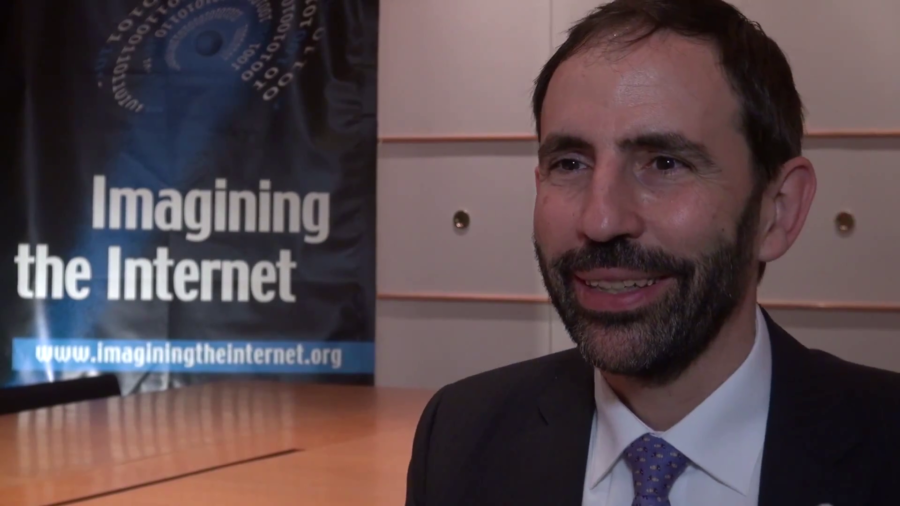Andreu Veà: In Spain, it’s never been something individual with teams. In my team, I started in 1992; typical connection of the university in Barcelona, Spain. And then I created the fourth ISP—Internet Service Provider, also in Barcelona. Because nobody had the chance to connect but the universities, and most of the companies were asking us for connectivity. That was in 1994, 1995. And later on, I was selected by the second telecom company, trying to open the monopoly that was Telefónica for Spain. And I was the director of the Internet there.
Intertitle: Describe one of the breakthrough moments of the Internet in which you have been a key participant?
Veà: Well, one of the things that I’m most proud of is launching the free access in Spain. That means free, as we were a telco carrier at the time in 1999. We developed a system in order to give free access.
After, that we made the flat rate one year later. Flat rate meaning that until that time it was only metered. Every minute you had to pay. So we created a flat rate, which meant that in one year we doubled Internet population of users in Spain. I am very proud of that.
And later on I was involved also in the creation of ESPANIX, the Spanish Neutral Internet Exchange and another two NICs, which are CATNIX and GalNIX. In different parts of Spain, we created different neutral Internet exchanges. Against the telco operators. They didn’t want it at the beginning. Now they’re really happy with them. But at the beginning it was really tough to create that. I am really proud of creating [them], and I was the president later on for a few years. These are probably I would say the most important things I have been involved with.
Intertitle: Describe the state of the Internet today with a weather analogy and explain why.
Veà: I would say it’s a little cloudy. It’s a little cloudy about not respecting I would say the original terms that the Internet was created [with]. Not everybody is sharing, not everybody is… There’s always this big tension against free, and then walled gardens everywhere. Big companies trying to change the rules. I’m talking about Facebook, I’m talking about big telco carriers, where they want to create not neutral nets. But this is humanity. We are always doing these things, right.
I am partly…with a big hope. Because the Internet is changing everything. Every sector, everything. But we are 5 billion people but we need to connect 5 billion more people. Not everybody knows to read and to write, or even to use a computer. But we are talking. Everybody knows how to speak. That means that probably I would say voice over IP will be the the next [indistinct] application for most of the countries that are not developed and don’t have connectivity. They will see the Internet as a cheap I would say telephone. And they will start using it.
Intertitle: What are your greatest hopes and fears for the future of the Internet?
Veà: Probably the biggest concern is if the Internet gets broken in pieces. And one of the best things now is that the Internet is one. It’s unique and you can connect, end-to-end, everywhere. We have started seeing in places like China that they have their own DNS systems, the firewalls. So they’re breaking the Internet in different pieces. So for me, this is a big concern because if they start putting you know, like country codes that different…it’s not unique anymore, that’s a big concern for me. And later on, the intrusion of countries which are not really “democratic,” I would say, trying to control the Internet. That’s for me a big concern.
Well, when we see that we can give access to everybody, one of my goals is to connect this next 5 billion people that we need to connect. And imagine that you can give Wikipedia access to everybody. I mean everybody. And this is really difficult. It’s still difficult. Because the Internet sometimes, especially in rural areas, is not easy to deploy. It’s not easy because it’s expensive. But my hope is that this is like a virtual circle that when you give access to a community, that community gets connected. As more users get connected, the wideband price drops. If it drops, you can connect more, and more people get connected there. Then you have more applications, more people developing. And then, it’s the community. And every time the prices drop. And this is really good for many places. Which doesn’t happen everywhere, in all the markets. But in this case, the wideband prices are dropping really really fast.
Intertitle: What action should be taken to ensure the best possible future?
Veà: Keep it open. Try to keep it open. Try to keep it neutral. This is really important. And to teach as many engineers as we have been doing until now, in most of the places. And to teach them the culture of openness, neutrality, to share. That’s why the OSI protocols lost the war. Because they were really by the book, really complicated. And the TCP/IP solution was what they called “quick and dirty,” but it worked. And it won the protocol wars because of this important thing of…I would say of sharing and these principles that the Internet has.
